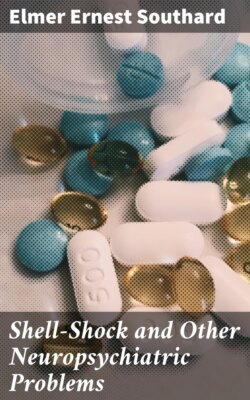Читать книгу Shell-Shock and Other Neuropsychiatric Problems - Elmer Ernest Southard - Страница 67
На сайте Литреса книга снята с продажи.
ОглавлениеA disciplinary case: Epilepsy.
Case 59. (Pellacani, March, 1917.)
A Milanese workman, 28, was exposed to the sun on sentry-go and had an attack of convulsions, on awaking from which he found himself in hospital. He always had attacks in reaction to emotion. One day, in a quarrel provoked by jealousy concerning a prostitute, he apparently lost his mind, whipped out a hunting-knife, and wounded a comrade. Thereafter he lay unconscious until the next day. The court-martial decided that he was not fully responsible.
Eventually, he was sent from the front for having insulted and struck a superior officer. The report read also that he was a prey to delirium and had frothed at the mouth. In the interior he had convulsive attacks, with falling and loss of consciousness. He told of arguing with a sergeant about a bicycle, of seeing darkness before his eyes like a veil, and of subsequent amnesia. In hospital he had intense headaches at times, with spells of sullenness, hostility, and complaints concerning nurses and attendants and other patients. At other times, he was quiet and comfortable. One day he went into an excitement and wept, asking to be sent back to the army, striking the table with his fist and head. He then screamed, flew into a passion, and fell to the ground in semi-stupor, shaking his body and trying to kick and knock away those who intervened. He was placed in bed but remained agitated and unconscious, with anesthesia and frothing at the mouth. The abdominal and cremaster reflexes were absent in this attack, and the pupils were rigid and myotic. The pulse was rapid and the blood pressure high. Afterwards he was sleepy, stupid and weary, and showed fine rapid tremors of hands, tongue, and eyelids. The abdominal reflexes now returned in excess, and a marked dermatographia developed.
Upon investigation, it was found that the patient’s father was also an epileptic and was alcoholic; that one paternal uncle had died in an asylum; another of apoplexy; that two maternal uncles were chronic alcoholics (one in an institution); that an alcoholic brother had been six times convicted of assault and battery; that a sister had howling, crying, and hair-pulling spells, throwing herself to the ground. The patient himself had had an early Bright’s disease and had always been an undisciplined, excitable, and impulsive boy, sometimes kept out of school. His first conviction was at 18, for assaulting a policeman, and he had been arrested four further times for assault and battery. He stated that his convulsive attacks with the veil before the eyes came on when he was irritated or had taken cold, or had drunk to excess, or had over-exerted himself. He said he suffered from intense headache, weariness, and sleepiness after an attack. He always bit his tongue at the same period. Irritation and exertion sometimes caused attacks of dizziness and vertigo without unconsciousness. Alcoholism; ulcer in an inguinal gland. He had been confined in an asylum 40 days for epilepsy, attacks of which had become more frequent after he had heard of his father’s death.
Re violence and epilepsy, Lépine remarks that a pure epilepsy unclouded by alcoholism may occasionally give rise to acts of extreme violence, but these pure epileptic violences are infinitely rarer than the alcoholic ones. The Milanese was in point of fact alcoholic, and in his ancestry were a number of alcoholics as well as epileptics. According to Lépine, when subjects are “out for blood,” they are almost always either, like this Milanese, hereditary alcoholics, or else strongly predisposed subjects, or even the offspring of the insane.
